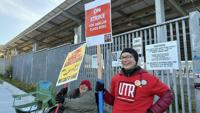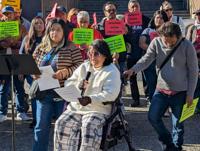
California State Assemblyman Al Muratsuchi. (mark6mauno/Wikimedia Commons)
This story was originally published by EdSource. Sign up for their daily newsletter.
They are not dead — yet – but time has all but run out.
That’s about as optimistic as it gets for Assembly Bill 84 and Senate Bill 414, two competing and contentious bills aimed at stopping the kind of charter school fraud that has already siphoned hundreds of millions of dollars from California’s public education system.
By the time the Legislature gavels out the 2025 session on Friday, it will have been more than a year since three statewide investigations called for stronger safeguards. In just the past six weeks, lawmakers, charter advocates, and labor unions logged at least 100 hours trying to find common ground on two bills shaped by those reports.
But talks broke down a week ago, stalled along familiar political lines.
AB 84, authored by Assemblymember Al Muratsuchi, D-Torrance, is backed by the state’s teachers unions and other labor organizations. SB 414, introduced by Sen. Angelique Ashby, D-Sacramento, is supported by charter school advocates.
In their original forms, both bills reflected recommendations from the statewide task force investigations in the wake of several massive cases of fraud, including:
- Expanding requirements to audit charter schools
- Prohibiting spending on entertainment unrelated to instruction (like theme parks)
- Improving data collection on enrollment, student-teacher ratios, and achievement in nonclassroom-based charters
- Strengthening training for charter school authorizers
- Creating an Inspector General’s office to investigate allegations of fraud
Negotiators managed to resolve 80%-90% of the disputes, according to people close to the talks. But the rest proved immovable. The biggest sticking points: whether to bar small districts (fewer than 10,000 students) from authorizing nonclassroom-based schools twice their own enrollment or larger, and whether to require new, costly accounting systems without reimbursing charters for the expense, even though traditional districts are.
“Frankly, the things that are left to negotiate over are essentially what I would call red lines for both labor and charter schools,” said Attorney Jerry Simmons, whose firm represents many charter schools. “I don’t think there’s any more common ground to be found.”
Labor leaders agreed. In a statement to EdSource, California Teachers Association President David Goldberg argued that SB 414 “would make it easier for bad actors to pad their pockets while weakening existing requirements for nonclassroom charter schools to prioritize spending on student learning.”
Then came Tuesday night.
Both SB 414 and AB 84 were amended in the Assembly. The changes to AB 84 came as an unwelcome surprise to charter advocates, since Muratsuchi had said he planned to hold his bill and bring it back next year.
The bigger surprise came when Sen. Dave Cortese, D-Silicon Valley, stripped the language of an unrelated bill and turned it into a fallback bill, Senate Bill 494, in case neither SB 414 nor AB 84 passes this session. The new SB 494 would extend a moratorium on new charter petitions for nonclassroom-based districts, set to expire this year, effectively giving lawmakers more time to revisit the issue in 2026.
So heading into the final hours of the legislative session, charter school advocates and others tired of waiting for the perfect compromise are urging passage of SB 414. Labor unions that support Muratsuchi’s AB 84 are calling for the passage of Cortese’s fallback. On a third front, a coalition of groups, including associations representing superintendents, administrators, and business officials, opposes both AB 84 and SB 414 while endorsing SB 494.
“More time is needed to resolve the differences between these two pieces of legislation so that local educational agencies are provided with clear and coherent expectations in the many areas they cover,” the groups wrote in their memo. “
A spokesperson for Cortese said that if either SB 414 or AB 84 is enacted, “the need for SB 494 will be reconsidered.”
David Patterson, co-founder and board president of the California Charter Authorizing Professionals, is among the pragmatists. His organization, which trains and supports authorizers, has long argued that the missing piece in the anti-fraud debate is a focus on high-quality authorizing practices.
With AB 84 presumably sidelined, Patterson said SB 414 — though imperfect — is a solid start because it strengthens auditing requirements and establishes an Inspector General’s office within the state Department of Education to investigate fraud and abuse.
“We’re hopeful that if a bill gets enacted this session, then that means we have an opportunity to come back next year and have a focused conversation on something much less controversial — adopting standards and structures on what constitutes high-quality authorizing in California,” Patterson said.
By sometime Friday — or Saturday, if lawmakers stretch the clock — the Legislature will have cast its votes. Only then will it be clear whether California’s anti-fraud push takes a step forward, or gets punted into the next round of enervating battles.
Kathryn Baron is a freelance writer.











(0) comments
Welcome to the discussion.
Log In
Keep it Clean. Please avoid obscene, vulgar, lewd, racist or sexually-oriented language.
PLEASE TURN OFF YOUR CAPS LOCK.
Don't Threaten. Threats of harming another person will not be tolerated.
Be Truthful. Don't knowingly lie about anyone or anything.
Be Nice. No racism, sexism or any sort of -ism that is degrading to another person.
Be Proactive. Use the 'Report' link on each comment to let us know of abusive posts.
Share with Us. We'd love to hear eyewitness accounts, the history behind an article.